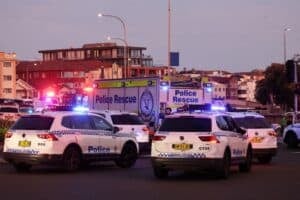Steenhuisen criticised the lack of action from a task team formed and led by Deputy President Paul Mashatile.

DA Leader John Steenhuisen has expressed concern over the worsening water supply crisis across the country.
He said water outages are becoming the norm in many areas.
“Some communities have not had water for months, despite having the necessary infrastructure, and this decline of water supply, particularly in Johannesburg — which used to be the second most reliable water provider behind the Western Cape — is unacceptable,” he said outside the South Hills Tower on Friday.
Mashatile’s task force a flop?
Steenhuisen criticised the lack of action from a task team formed and led by Deputy President Paul Mashatile, noting that no noticeable interventions had been initiated.
“The senior leadership meant to plan and implement proper water management in their towns and cities have checked out and are absent as residents face worsening outages. Millions of rands of water continue to be lost through leaks and illegal connections,” he said.
Standing beside a banner illustrating water outages across the country, he highlighted the Western Cape’s 3% water outage rate as a benchmark for reliable water supply.
NOW READ: Water crisis deepens: 13% of SA’s water now unsafe to drink
Government must take responsibility
He called for provincial and local governments to take responsibility, particularly in Gauteng and accused the ANC-led coalition of negligence.
“We have seen a hands-off approach by Premier Panyaza Lesufi and the provincial government. We have seen a don’t-care attitude by the Action South Africa, EFF, and ANC-led council here in Johannesburg.
“We do not accept dry taps as a new normal, and neither should residents,” he said.
ALSO READ: Fix our water by firing the cadres
Water throttling
Earlier in November, Water and Sanitation Minister Pemmy Majodina announced “water throttling” as one of the urgent measures to address the growing water crisis in Johannesburg.
This involves throttling and closing certain high-demand zones to allow reservoir levels to recover overnight. The city intends to implement this continuously from November 14 until the system stabilizes.
In a media briefing last week, Johannesburg Water’s Logan Munsamy revealed that 22 reservoirs are currently leaking above acceptable levels.
Spare some change: R280 billion needed
DA Gauteng leader Solly Msimanga blamed the crisis on the slow government response, emphasising the significant infrastructure funding gap.
He noted that the City of Johannesburg needs approximately R100 billion for infrastructure upgrades, while Ekurhuleni and Tshwane metros each require around R90 billion.
Communities in areas such as Melville, Emmarentia, Coronationville, Westdene, and Westbury have been left with little to no water.
ALSO READ: Postpone Rand Water’s December shutdown, activists demand
“The lack of proper planning and foresight is to blame for what we’re facing now.
“You now have populist rhetoric from Rand Water. Even if you were to increase capacity, the fact remains that the existing infrastructure cannot handle the demand because it is old,” Msimanga said.
He added that the province’s 11 municipalities, including the metros, are incapable of independently addressing the infrastructure and maintenance challenges.
“We have said from the beginning, even when engaging with Premier Lesufi, that an infrastructure master plan is critical.
“The provincial government must consolidate resources at the local level, establish an infrastructure grant funded provincially, and implement it locally.
“This will enable the rebuilding and replenishing of infrastructure and ensure accurate billing,” he said.
NOW READ: Who is wasting water?






